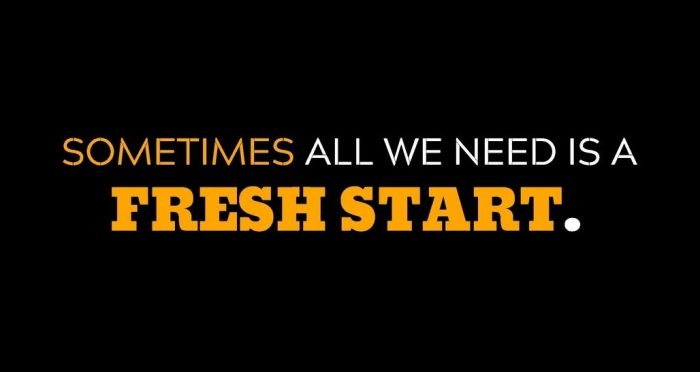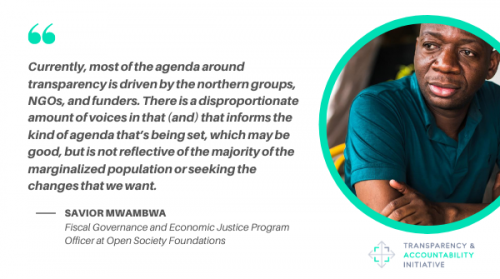Highlights
- Fever dreams
- Seeking a clean shot
- Algorithmic saints and sinners
- Systemic skews
- Baseless yet effective?
- TAI Spotlight: The limits of learning as usual
Fever dreams

Image credit: The Trevor Project
While so much attention has been focused on elections these past weeks (with good reason), the pandemic continues to worsen in many parts of the globe. Lisa Cornish details how the pandemic has “placed a magnifying glass” on pre-existing environmental and social issues, including flaws in policy, partnerships, and essential development and humanitarian service delivery. Rockefeller Foundation seems to have been listening as they commit $1 billion to efforts to end “energy poverty”.
For their part, Elisa Pilichowski and Pascal Saint-Amans at the OECD argue that neither green budgeting nor tax policy tools alone will secure a successful green recovery. We need both.
To get both, we will need sustained public pressure. On that note, Richard Stern weighs in on the importance of maximizing civic engagement to combat COVID-19 and why support for civic engagement should be part of donor relief efforts. Meanwhile, ODI have identified seven principles to make communication and community engagement more effective for community practitioners, humanitarian coordinators and donors.
Want to put current debates in context? Government Watch is celebrating its two decade anniversary on the frontline of accountability with the launch of “TPA Now! Rebooting Accountability” paper series. The first lays out the context and why the, “campaign for accountability not only has to continue, but it also has to be done better and differently.”
Essential listening: Lessons on fulfilling civic duties
Listen to this NPR interview with Baratunde Thurston, host of the podcast How to Citizen With Baratunde, about the steps people should take beyond voting to engage in their civic duty. Seems to have even more resonance after events this past week (though we’re struggling with verbing “citizen”).
Seeking a clean shot

Image credit: Amazon
The US electoral outcome will have significant implications for everything from open government to climate negotiations, but staying with the pandemic, Amanda Glassman discusses why joining and allocating funding to the COVAX initiative – the international effort to pool funding for a COVID-19 vaccine – is an immediate priority for U.S. national security and global health leadership. That should extend to minimizing corruption risks in vaccine production and distribution in addition to assuring equitable access.
With cases of misuse and mismanagement of COVID-19 funds reported globally, Vivek Ramkumar, Ed Olowo-Okere, and Martin Aldcroft advocate for independent oversight in public spending. Sophie Lemaître argues that funds recovered by governments from anti-money laundering settlements should be channeled towards the public good by establishing dedicated funds for transparency and accountability work and reparation mechanisms
Adam Roberts takes a look at corruption under the Trump administration and the weakening of rule of law institutions while the Committee for the Protection of Journalists Deputy Director, Robert Mahoney is unimpressed by the latest move to restrict foreign journalist visas in the U.S. He warns this could have a chilling effect on press freedom worldwide as the glow of the United States as a beacon for press freedom continues to dim.
Concerns on crackdown on press freedom intensified globally this past week with major reports from Cambodia, Hong Kong, India, Zimbabwe, United States, and United Kingdom. Anna Romandash takes a look at post-election protests in Belarus where thousands of citizens have been detained and over 400 cases of persecution of journalists were raised.
Of course, it is not just journalists facing clampdowns. Advocacy Accelerator reports on the impact of COVID-19 on advocacy in Africa as Bhekinkosi Moyo advocates for the need for Africans to tell their own stories and build the data to support a narrative shift around Africa philanthropy. Despite ongoing challenges, Brendan O’Donnell reports on the success of civil society advocacy in Burkina Faso.
Algorithmic saints and sinners
Both media and NGOs can take inspiration from these four fact-checking initiatives that prioritize social impact and strive towards equipping them with media literacy skills and safeguarding democracy. For their part, Carl Miller and Chloe Colliver offer a toolkit for organizations to monitor disinformation on subjects they care about. The importance of statistical literacy is also proving its value during the pandemic (as well as for vote counting and analysis!) as Carlo Rovelli highlights.
Turning to national and global levels, OECD country ministers call for multilateral cooperation to address growing digital security challenges.
Yet, what about turning to artificial intelligence (AI) to amplify civic freedom and transparency? Explore Nesta’s new Civic AI toolkit which shows how AI and data can assist communities in tackling the climate crisis and solve public problems.
Sound too rosy a view? Well, there is active work on AI governance that you can contribute to. Share your views on the draft Global Partnership for AI Data Governance Working Group Framework. The framework will guide the responsible adoption of AI that is grounded in human rights, inclusion, diversity, innovation, economic growth and societal benefit. Already demonstrating leadership in this space, the Helsinki and Amsterdam city governments launch AI transparency registers that details how the municipalities use algorithms and personal data in their public services.
What does it all mean? Take a pause and enjoy I am A.I. and Thou – a poem by data policy professor Anne L. Washington on how well data represents our lives, written as part of the Open Data Institute’s Writers’ Fund for Black History Month 2020.
Full Disclosure – The People Behind TPA: Savior Mwambwa on the future of tax justice – “More will; enough rhetoric”

Open Society Foundations’ program officer, Savior Mwambwa, talks about changes in tax justice programming and challenges in achieving equitable tax
Systemic skews
Can local procurement promote economic justice? Kathrin Frauscher writes on government procurement inequality and how black-owned businesses are locked out of government contracting opportunities in the United States.
We’re intrigued to see Latin America’s largest corporate borrowers doubling down on commitments to sustainable finance, tying new bank loans to key performance indicators that ensure companies adhere to more transparent environmental, social and governance (ESG) metrics for big players such as cement giant Cemex and telecom firm Millicom.
Corporate positions on tax are only just rising up investor concerns, but they have long been the source of government angst. Mick Moore makes the case that African tax administration suffers from a preoccupation with formalization while major sources of untapped revenues lie elsewhere, including the incomes and assets of the wealthy and unjustified corporate tax exemptions. How to capture more of those revenues? The latest Tax Inspectors without Borders annual report offers some pointers. Meanwhile, a new study in Ethiopia from the International Centre for Tax and Development finds a positive correlation between female-owned firms and tax compliance.
Baseless yet effective?
Turning to the aid sector, a multi-country Humanitarian Policy Group project undertaken at ODI in partnership with UNICEF finds that despite multiple commitments over the past few years, collective accountability is not yet happening in practice.
What of measuring results of projects? Jeffrey McManus shares considerations for using baselines in impact evaluations. Hint: baseline data is nonessential for impact evaluations and is not always cost-effective. IDinsight share cost-effectiveness analysis recommendations from helping a family philanthropy prioritize its antipoverty programs in rural Malawi.
Good to see UNDP restructuring its learning agenda by shifting focus from approaches and solutions to deeper questions about “why” and “for whom” and from single point interventions to systemic long-term portfolios.
We’ve been highlighting the MacArthur Foundation analysis of the demographics of its US grantees (see TAI Spotlight below), so interesting to now read Robert Wood Johnson Foundation’s five values-driven strategies that guided their approach to collecting and understanding demographic data about their grantees.
We are testing out this online calculator from Swiss Innovation Academy to plan our next virtual meeting. You will find other resources and tools for innovation on their website – many are free of charge.
Finally, we could all do with some self-care after the stresses of the past week, so don’t miss Stanford Social Innovation Review series on the connection between inner well-being and effective social change.

Essential Participation: Add your voice to Integrity Action’s Brainstorming survey
Please fill out this survey with key questions about how citizen-centred accountability mechanisms can be funded, governed, and administered in the long term.
TAI Spotlight: The limits of learning as usual
The limits of learning as usual | Transparency and Accountability Initiative
Jorge Florez (Global Integrity), Kamyar Jarahzadeh (National Resource Governance Institute), Tassaduq Rasul (Oxfam), Brendan Halloran (International Budget Partnership) and Samir Khan (International Budget Partnership, shares six lessons that reinforce key learning for organizations working in fiscal governance.
Respect the process | Luminate
Luminate CEO Stephen King asks US electoral candidates to respect the democratic process and listen to the will of the American people. On International Day to End Impunity for Crimes against Journalists, Luminate’s lead on global strategy for funding independent media, Nishant Lalwani, talks about the need to defend media freedom.
Examining demographics, changing our status quo | MacArthur Foundation
MacArthur Foundation share results and next steps from a survey of their U.S.-based grantees and impact investees to examine whether their funding is reinforcing inequities.
At the open government digital youth summit | Chandler Foundation
Chandler Foundation Director of Social Impact, Leslie Tsai, co-hosts discussion on youth advocacy for open government at the recent Open Government Digital Youth Summit
Philanthropy’s response to the Great Depression | Hewlett Foundation
Watch out for a Hewlett-backed study by historian Benjamin Soskis on grantmaking during the Great Depression. The study will highlight crucial lessons philanthropy can draw from the past.
Narrative Power and Collective Action Vol. II | Ford Foundation and Open Society Foundations
Check out the profile of Ford’s Sophia Hernández as a feminist funder and Brett Davidson of the Media and Narratives Division at the Open Society Public Health Program as a narrative change funder and many other inspiring profiles of social change actors.
Job Listing
- Assistant Editor in Chief for Investigations at OCCRP (Based in Sarajevo) – November 15, 2020
- Global Fund for Community Foundations hiring Global Network Weaver – November 27, 2020
- Government Affairs Senior Policy Advisor, International Financial Institutions at Oxfam – Ongoing
- Data Architect at Open Data Institute – Ongoing
- Luminate Director, Africa – Ongoing
- Job postings at Hewlett Foundation – Ongoing
- Job postings at MacArthur Foundation – Ongoing
- Job postings at Open Society Foundations – Ongoing
- Job postings at Luminate – Ongoing
- Job postings at Ford Foundation – Ongoing
- Senior Policy Advisor for Civic Space at Oxfam America – Ongoing
Call/ Opportunities
- Call for evidence: From science to practice: Research and knowledge to achieve the SDGs – November 30
- Call for Media to Amplify Abolition – December 1, 2020
- World Justice Challenge 2021 – December 11, 2020
- Governance and the COVID-19 Pandemic in the Global South, EGAP – December 15, 2020
- Call for submissions to SSIR Series: Social change in an era of extreme polarization – Last Thursday of every month until early 2021
- USAID’s Development Innovation Ventures (DIV) grant funding – Ongoing
- BetterTogether Challenge for innovators – Ongoing
- Call for research proposals Tax and civil society – No Deadline
- Free Digital Security Training – Ongoing
- Open Road Alliance Charitable Grant and Loan to organizations responding directly to COVID-19 – Ongoing
- Pulitzer Center Coronavirus news collaboration challenge – Applications will be reviewed on a first-come, rolling basis
- Call for proposals: Informality, tax, and the state – Proposals accepted on a rolling basis
Calendar
- Open Data Institute Summit – November 10, 2020 (online)
- Measuring What Matters – November 12, 2020 (11A GMT and 3P GMT)
- Webinar: “Crisis As An Engine Of Public Sector Trust: Opportunities For COVID-19 Recovery” – 12 November 2020 (2.30-4.30 pm CET)
- Public Policy Summit – November 12-13, 2020
- Tax for Development Webinar Series – November 17; December 1; December 15, 2020 (15:00 – 16:00 CET)
- First 24-Hour Conference on Global Organized Crime – November 10th (11th in Asia/Oceania)
- Digital Freedom Fund Virtual Litigation Retreat – November 12-18, 2020 (excluding weekend)
- World Forum for Democracy (democracy and the environment) – November 16-18, 2020
(Strasbourg, France) - Accountable Now Annual Workshop – November 17-19, 2020
- RCTs in the Field of Development: A Critical Perspective – November 17, 2020 12P EST
- The Impact of Big Tech: What is the solution? — November 17, 2020 (1-2pm EST)
- OECD Global Blockchain Policy Forum — November 19, 2020 (15:35 – 16:25)
- Make Democracy Great At Last – November 19, 2020 (10am EST)
- A Procurement Path to Equity: Virtual Report Launch – November 19, 2020 (12pm, ET)
- Transparency International: 19th International Anti-Corruption Conference – December 1-4, 2020 (online)
- International Open Data Conference – Postponed till 2021
- Tips for Successful Online Meetings with Major Donors – December 10, 2020 (2:00 – 3:15 PM ET)


